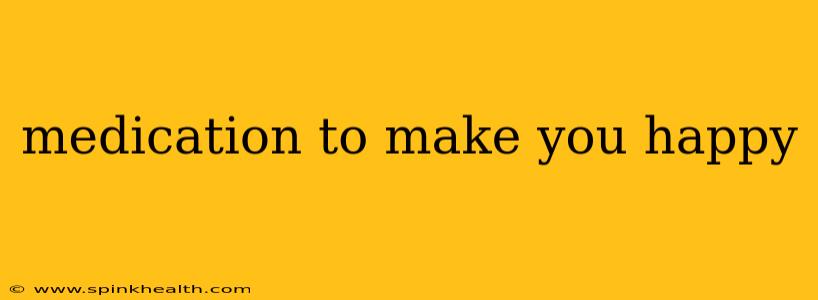The Quest for Happiness: Understanding Medication and Mood
Let's be honest, the idea of a magic pill to instantly conjure happiness is alluring. We all crave joy, contentment, and a sense of well-being. But the search for a "medication to make you happy" is a complex journey, one that requires understanding the nuances of mental health and the role of medication in treating underlying conditions. This isn't about finding a quick fix, but about navigating a path toward lasting emotional well-being.
My journey to understanding this topic started with a personal experience. A close friend struggled with persistent sadness, a deep-seated unhappiness that affected every aspect of their life. Their doctor suggested medication, but the path to finding the right one was long and challenging. This personal connection fueled my research into the complexities of mood disorders and the role of pharmaceuticals. This isn't medical advice – always consult a professional for your specific situation.
What Medications Treat Depression and Anxiety?
This is a question many people ask, and the answer isn't a single pill. The medications used to treat depression and anxiety fall into several categories, each with its own mechanism of action and potential side effects. Some commonly prescribed classes include:
-
Selective Serotonin Reuptake Inhibitors (SSRIs): These are often the first line of defense for depression and anxiety. They work by increasing the availability of serotonin, a neurotransmitter associated with mood regulation. Examples include sertraline (Zoloft), fluoxetine (Prozac), and escitalopram (Lexapro).
-
Serotonin-Norepinephrine Reuptake Inhibitors (SNRIs): SNRIs increase both serotonin and norepinephrine, another neurotransmitter involved in mood and focus. Venlafaxine (Effexor) and duloxetine (Cymbalta) are examples.
-
Tricyclic Antidepressants (TCAs): Older than SSRIs and SNRIs, TCAs have a broader range of effects on neurotransmitters but often come with more side effects.
-
Monoamine Oxidase Inhibitors (MAOIs): MAOIs are typically reserved for cases where other antidepressants haven't been effective. They require dietary restrictions due to potential interactions.
-
Atypical Antidepressants: This category includes medications with unique mechanisms of action, such as bupropion (Wellbutrin), which is sometimes used for depression and can aid in smoking cessation.
Can Medication Make You Happy?
This is a crucial point. Medication doesn't create happiness in the sense of providing a euphoric feeling. Instead, it aims to alleviate the symptoms of underlying conditions like depression and anxiety that prevent someone from experiencing joy and well-being. Think of it as removing obstacles that block your path to happiness, not as directly creating happiness itself. Improving your mood through medication allows you to engage in activities and experiences that bring you genuine joy.
What are the Side Effects of Antidepressants?
Side effects vary widely depending on the individual and the specific medication. Common side effects can include:
- Nausea: This is relatively common, often subsiding as the body adjusts to the medication.
- Weight changes: Some antidepressants may cause weight gain or loss.
- Sleep disturbances: This can manifest as insomnia or excessive sleepiness.
- Sexual side effects: Decreased libido or difficulty achieving orgasm are potential side effects.
- Headaches: Headaches are a relatively frequent side effect.
It's essential to discuss any potential side effects with your doctor. They can help manage side effects or adjust your medication accordingly.
Is There a Natural Alternative to Antidepressant Medication?
While lifestyle changes like regular exercise, a healthy diet, sufficient sleep, and mindfulness practices can significantly contribute to improved mood, they aren't always sufficient to treat severe mental health conditions. These approaches can be beneficial alongside medication, not as a replacement. It’s vital to approach mental health holistically, combining professional medical help with lifestyle adjustments.
How Long Does It Take for Antidepressants to Work?
The timeline for noticing the effects of antidepressants varies. It can take several weeks, or even months, before experiencing significant improvement in symptoms. Patience and consistent adherence to the prescribed medication regimen are crucial. Don't be discouraged if you don't see immediate results.
The journey to emotional well-being is deeply personal. While medication can be a valuable tool in managing mental health conditions, it’s crucial to remember that it’s part of a broader approach involving professional guidance, lifestyle changes, and self-care. It's not about a "magic pill" for happiness, but about creating a supportive environment for your mental health to thrive. Always consult a healthcare professional for personalized advice and guidance.

